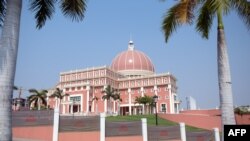Opposition legislators have boycotted a vote in Angola's parliament in a rare show of dissent against one of Africa's most autocratic governments, accusing it of covering up details of lawmaking and new loan deals struck with China.
President Eduardo do Santos has held power for 36 years but discontent has grown over China's increasing economic dominance in Africa's No. 2 oil-exporting country while most Angolans remain impoverished, seeing little benefit from energy revenues.
The main opposition UNITA party, which waged a 27-year civil war with dos Santos's MPLA until 2002, and smaller opposition groups boycotted parliamentary debates and votes on several bills including an investment law on Wednesday.
The bill, meant to increase foreign investment in the southwest African nation, ended up being passed unopposed by MPLA lawmakers.
Few details of the law were made public by the government but it entailed reducing bureaucracy and creating special economic zones, free-trade zones and unspecified "investment incentives", according to the MPLA.
UNITA lawmakers called for full details of all bills to be made public and said parliamentary debates and votes should be televised on independent news channels, rather than the current system of edited excerpts in state-run media.
"Angolans do not have the opportunity to know what is happening in this house that is supposed to represent us all," UNITA MP Mihaela Webba told the national assembly.
The MPLA did not immediately comment on the need for greater transparency in parliament, but said the investment law was crucial to improving competition and increasing investment.
UNITA MPs also urged dos Santos to reveal details of the multi-billion-dollar loans that he agreed in Beijing last month and were billed as helping to prop up public finances hammered since global oil prices dropped by half last year.
Many Angolans are angered by the increasing Chinese influence in what is sub-Saharan Africa's third largest economy.
They believe powerful politicians and Chinese companies gain the biggest benefit from opaque loan deals.
"How much did our president get from China? Nobody knows. How will we pay for it? Nobody knows," UNITA lawmaker Raul Danda told parliamentarians. "We asked our president to explain what he did in China but the boss does not talk."
But any serious anti-government movement is still seen as unlikely since Luanda has the best-funded army in sub-Saharan Africa and dissent is usually quelled quickly and ruthlessly.
China has lent Angola around $20 billion since the civil war ended, according to Reuters estimates. Repayments are often paid with oil or funds go directly to Chinese construction firms that have built roads, hospitals, houses and railways across Angola.
This means dollars don't end up entering the real economy, increasing costs for ordinary Angolans. Millions still live on less than $2 a day and World Bank studies rank the country 169 out of 175 countries in terms of income equality.







